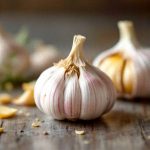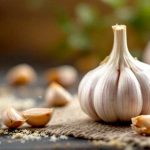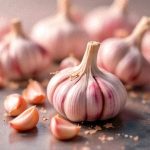Takeaways
- Garlic contains compounds that may reduce allergy symptoms
- Studies suggest garlic can boost immune function
- Quercetin in garlic acts as a natural antihistamine
- Garlic may help with seasonal, food, and skin allergies
- Regular garlic consumption could prevent allergy flare-ups
- Consult a doctor before using garlic as an allergy treatment
Introduction to Garlic and Allergies
Garlic has been used in cooking for a very long time.[1] It adds a strong flavor to food. But garlic might also have health benefits.[2] One area scientists are looking at is how garlic affects allergies.[3]
Allergies are a common problem for many people around the world.[4] They can cause symptoms like sneezing and itching. While some people use medicines from stores, others look for natural solutions. Garlic is one natural option that some people are exploring for allergy relief.
The idea that garlic could help with allergies is interesting. Some studies suggest garlic might make allergy symptoms less severe.[5] It may also help the body’s defenses overall. This information explores what research has found about these possible benefits.
The Science Behind Garlic’s Allergy-Fighting Properties
Garlic’s Chemical Composition
Garlic contains various active substances.[6] These give garlic its unique smell and taste. They are also thought to contribute to its possible positive effects on health.
| Compound | Function |
|---|---|
| Allicin | Antioxidant, antimicrobial |
| Quercetin | Antihistamine, anti-inflammatory |
| Diallyl sulfide | Immune-boosting |
| Ajoene | Antifungal, antibacterial |
These substances interact with the body in different ways.[7] For example, allicin is created when garlic is crushed.[8] Allicin is a strong antioxidant.[9] Quercetin is another substance that may help to reduce inflammation.[10]
Antihistamine Effects
Histamines are important in allergic reactions.[11] When the body encounters something it is allergic to, it releases histamines. These chemicals cause allergy symptoms such as sneezing, itching, and a runny nose.
Garlic may have natural properties that act like antihistamines.[12] Research suggests it could reduce how much histamine the body produces.[13] This could lead to fewer allergy symptoms.[14] It might work differently from typical allergy medications.
Most allergy medicines work by blocking histamine receptors.[15] Garlic, on the other hand, might stop the release of histamine.[16] This could potentially offer longer-lasting relief from symptoms. More research is needed to understand this better.
Immune System Boost
The immune system protects the body from harmful things.[17] It is also involved in allergic reactions. A healthy immune system might make allergies easier to manage.[18]
Garlic could enhance immune function in several ways:
- Stimulating white blood cell production
- Enhancing natural killer cell activity
- Reducing inflammation in the body
Garlic might support overall immune health.[19] A stronger immune system may help prevent overreactions to allergens. Regular garlic consumption could possibly lead to fewer allergy problems in the long run.
Types of Allergies Garlic May Help With
Allergies can appear in many ways and affect different parts of the body. Garlic might help with different types of allergies.
| Allergy Type | Potential Effectiveness of Garlic |
|---|---|
| Seasonal | High |
| Food | Moderate |
| Skin | Moderate |
| Pet | Low to Moderate |
| Dust | Moderate |
Garlic seems most promising for helping with seasonal allergies.[20] Its possible antihistamine effects could target hay fever symptoms.[21] For allergies to food or skin, garlic might provide some indirect benefits.
Seasonal Allergies
Seasonal allergies happen during certain times of the year. Common causes include pollen, grass, and ragweed. These allergens can lead to sneezing, a stuffy nose, and itchy eyes.
Garlic may help to reduce the symptoms of seasonal allergies. The quercetin in garlic could reduce swelling in the nose.[22] This could make breathing easier. Garlic’s ability to support the immune system might also be helpful.[23]
To use garlic for seasonal allergies, try these tips:
- Start consuming garlic before allergy season
- Add fresh garlic to meals regularly
- Consider garlic supplements for consistent intake
- Combine garlic with other natural remedies
Food Allergies
Food allergies involve the body’s reaction to certain foods. Common food allergens include nuts, milk, and shellfish. Symptoms can range from mild to severe.
Garlic’s role in managing food allergies is not as direct.[24] It might help by making the immune system stronger overall. A balanced immune system might react less strongly to food allergens.
However, be cautious when using garlic for food allergies.[25] Some people are actually allergic to garlic.[26] Always speak with a doctor before trying new treatments. Food allergies can be serious and should be managed by a professional.
Skin Allergies
Skin allergies can cause rashes, itching, and irritation. They may result from contact with allergens or reactions inside the body. Garlic might provide some relief for certain skin allergy symptoms.
Garlic has properties that can fight germs.[27] These properties might help with skin infections that make allergy symptoms worse. The anti-inflammatory effects of garlic may also reduce itching and swelling.[28]
You can use garlic for skin allergies in two ways:
- Consume garlic orally for systemic benefits
- Apply garlic topically (with caution)
When using garlic on the skin, it is important to dilute it first.[29] Pure garlic can irritate sensitive skin. Always test it on a small area before applying it more widely. Stop using it if you experience any irritation.
Forms of Garlic for Allergy Relief
Garlic is available in different forms. Each form may offer different advantages for people with allergies. The best form depends on what you need and prefer.
Fresh Garlic
Fresh garlic is the most powerful form.[30] It contains a high level of active compounds. Crushing or chopping fresh garlic releases allicin.[31] This substance provides many of the health benefits of garlic.
To use fresh garlic for allergies, try these methods:
- Add minced garlic to meals
- Make garlic tea by steeping crushed cloves
- Take a small piece of raw garlic daily (if tolerated)
Fresh garlic provides the most direct benefits. However, it can have a strong flavor and cause bad breath. Some people may find it difficult to eat it regularly.
Aged Garlic Extract
Aged garlic extract (AGE) is created using a special process.[32] Garlic is aged for months in alcohol. This creates a milder product that doesn’t smell as strong. AGE contains different substances than fresh garlic.
AGE may be easier to tolerate than fresh garlic. It is less likely to cause stomach upset. Studies show that AGE can improve the immune system. This could be useful for managing allergies.
The aging process reduces the amount of allicin.[33] However, it increases other helpful substances.[34] AGE provides a more stable and consistent dose of garlic’s active ingredients.
Garlic Supplements
Garlic supplements come in forms such as capsules, tablets, and oils.[35] They offer a convenient way to consume garlic regularly.
When choosing a garlic supplement, consider these factors:
- Allicin content
- Standardization of active compounds
- Brand reputation
- Third-party testing
Supplements can provide consistent dosages.[36] This makes it easier to track potential benefits. They also eliminate the strong taste and odor of fresh garlic.
However, supplements may not offer all the benefits of whole garlic. The processing of garlic can change its chemical makeup. It is important to choose high-quality supplements from reliable companies.
Incorporating Garlic into Your Allergy Management Plan
Managing allergies requires a well-rounded approach. Garlic can be part of a larger plan. It should support, not replace, other treatments.
Garlic might make standard allergy treatments work better. It could reduce the need for medications for some people. But it’s important to never stop taking prescribed medications without talking to a doctor first.
Dietary Strategies
Adding more garlic to your diet is a simple way to start. Consuming garlic regularly may provide increasing benefits. Here are some ways to include more garlic in your meals:
- Use garlic as a base for soups and stews
- Add minced garlic to salad dressings
- Roast whole garlic cloves for a milder flavor
- Incorporate garlic into homemade sauces
To maximize garlic’s allergy-fighting potential:
- Crush garlic and let it sit before cooking
- Use raw garlic when possible
- Add garlic near the end of cooking
- Combine garlic with other anti-inflammatory foods
How you cook garlic can change its properties. Raw garlic has the most active substances.[37] Cooked garlic is still beneficial and easier to eat in larger quantities.
Supplement Regimens
If using garlic supplements, follow these guidelines:
- Start with a low dose and increase gradually
- Take supplements consistently for best results
- Choose a standardized product for reliable dosing
- Consider cycling on and off to prevent tolerance
Garlic can interact with some medications.[38] It may affect blood clotting and blood sugar levels. It is important to tell your doctor about any supplements you are taking.[39]
For allergy relief, timing can matter. Start eating garlic before allergy season starts.[40] This gives it time to have an effect. Continue using garlic throughout the season to maintain the benefits.
Potential Side Effects and Precautions
Garlic is generally safe for most people. However, it can cause side effects, especially in large amounts. Common side effects include:
- Bad breath
- Body odor
- Digestive upset
- Increased bleeding risk
People with certain conditions should use caution with garlic:
- Bleeding disorders
- Upcoming surgery
- Diabetes
- Low blood pressure
Pregnant women should talk to a doctor before using more garlic.[41] Garlic supplements may not be safe during pregnancy.[42]
Garlic can also interact with some medications. This includes blood thinners and HIV medications. Always check with a doctor before starting any new supplement.
Research and Evidence
Scientific studies on garlic and allergies show promising results. Many studies focus on how garlic affects the immune system. Others look at its impact on specific allergy symptoms.
One study found that aged garlic extract reduced nasal allergy symptoms.[43] Participants experienced less congestion and sneezing. Another study showed that garlic compounds could suppress allergic reactions in mice.
However, a lot of the research is still in early stages. Many studies use animals or small groups of people. More extensive studies with humans are needed.[44] This would help confirm how effective garlic is for allergies.
Current research has limitations. Most studies focus on specific garlic substances. They may not reflect the effects of eating whole garlic. Long-term studies on garlic and allergies are needed.
It is important to have evidence-based approaches when using natural remedies. Garlic shows potential, but more research is needed. Future studies should explore:
- Optimal dosing for allergy relief
- Long-term effects of garlic consumption
- Comparisons with standard allergy treatments
- Effectiveness for different allergy types
Until more information is available, use garlic as a supplementary approach. Do not depend on it as the only treatment for allergies.[45]
FAQ: People Also Ask
Can garlic cure allergies?
How much garlic should I take for allergies?
Is garlic safe for children with allergies?
Can I be allergic to garlic itself?
How long does it take for garlic to help with allergies?
Are there any alternatives to garlic for allergy relief?
Conclusion
Garlic may offer advantages for those who suffer from allergies.[53] Its substances may reduce inflammation and boost immunity. Some people experience fewer allergy symptoms with regular garlic use.
However, each person reacts to garlic differently. What works for one person may not work for another.[54] Garlic should be included as part of a comprehensive allergy management plan.[55] It is not a replacement for medical treatment.
If you are thinking about using garlic for allergies, talk to your doctor. They can help you understand the potential benefits and risks. They can also make sure that garlic will not interfere with any other treatments.
Remember that managing allergies is a personal process. Garlic might be a helpful tool. However, it is just one part of the solution. A complete approach, guided by medical professionals, offers the best chance for improvement.
Garlic has been used in cooking for thousands of years, dating back to ancient civilizations.
Garlic has been studied for its potential benefits, including cardiovascular and immune-boosting effects.
Scientists are exploring various natural substances for their potential effects on allergies, including garlic.
Allergies affect a large percentage of the population worldwide, with varying levels of severity.
Some preliminary studies indicate garlic may have properties that could lead to a reduction in allergy symptom severity, but more research is required.
Garlic contains compounds like allicin, quercetin, and others that contribute to its flavor and potential health benefits.
The various compounds in garlic can have different effects within the human body, on different systems and cellular functions.
Allicin is formed when the enzyme alliinase in garlic comes into contact with alliin when garlic cells are damaged, such as by crushing.
Allicin has been shown to have antioxidant activity in laboratory studies. In humans, the impact of this antioxidant activity is still being researched.
Source: “Allicin and Cancer Hallmarks” https://www.ncbi.nlm.nih.gov/pmc/articles/PMC10975206/
Quercetin, found in garlic and other plant-based foods, has been investigated for its anti-inflammatory activity in several studies.
Histamines are chemicals released by the immune system that are responsible for many of the symptoms associated with allergies.
Some research indicates garlic compounds may affect histamine release, but more rigorous studies are required.
Some preliminary studies indicate garlic may affect histamine release, however, more rigorous studies are required.
If garlic does indeed reduce histamine release, this might lead to a reduction in allergy symptoms.
Typical allergy medications work by blocking histamine receptors in the body, which reduces the impact of histamine and the symptoms it causes
Some studies have indicated that certain garlic compounds might reduce the amount of histamine that’s released, potentially leading to longer lasting relief from symptoms.
The immune system is the body’s defence mechanism against pathogens and other harmful substances.
A balanced immune system is less likely to overreact to harmless allergens.
Some studies indicate that garlic compounds may modulate the immune system, but further research is needed.
Some studies have focused on garlic’s potential role in alleviating hay fever symptoms.
If garlic does have antihistamine properties, then it could theoretically alleviate hay fever symptoms.
Quercetin has anti-inflammatory properties and may reduce swelling in the nasal passages.
Garlic’s potential to support the immune system could help to regulate allergic reactions, though further studies are needed.
Garlic’s potential benefit for food allergies appears to be more linked to general immune function, rather than a direct effect on specific food allergens.
It’s essential to exercise caution due to the possibility of garlic allergy itself, as well as other potential adverse effects.
Garlic can trigger allergic reactions in certain people, with varying degrees of severity.
Garlic has compounds that have been shown to have antibacterial, antiviral, and antifungal properties.
Source: “Onion and garlic polysaccharides: A review on extraction, characterization, bioactivity, and modifications.” https://pubmed.ncbi.nlm.nih.gov/35914557/
Garlic compounds that have anti-inflammatory effects may also help with the swelling, itching and redness seen in some skin allergies.
Undiluted garlic can cause irritation or burning, especially on sensitive skin.
Fresh garlic contains the highest level of active compounds such as allicin, which contributes to the most potent effects.
The enzyme alliinase and alliin are released when garlic cells are damaged, creating allicin.
Aged garlic extract is created by soaking garlic in an alcohol solution for an extended period of time.
During the aging process, allicin is converted to other compounds, which leads to a reduction in allicin
During the aging process, new compounds such as S-allyl cysteine are produced, which may have their own benefits.
Garlic supplements are widely available in a range of delivery systems, including capsules, tablets, and oils.
Unlike fresh garlic which can have variable levels of active compounds, supplements allow for predictable dosages.
Raw garlic has more active enzymes and compounds than cooked garlic, therefore it has a stronger therapeutic effect.
Garlic may affect blood thinning and blood sugar, which can interact with some medications.
It’s important to inform your doctor of all supplements you are taking to avoid any adverse medication interactions.
Starting garlic before allergy season could help to build a more robust immune response in advance of exposure.
Garlic supplements may not be safe during pregnancy and should be taken only after consulting with a doctor.
Due to the lack of sufficient research, the safety of garlic supplements during pregnancy has not been established, and consultation with a doctor is advised.
Some studies have shown that aged garlic extract may help reduce nasal allergy symptoms, however, the evidence is not fully conclusive.
Many studies have been done using animals or in laboratory settings, and there is a need for more human clinical trials to validate results and investigate effective dosages.
Garlic should be used as a supplementary treatment, and not in place of conventional treatments for allergies.
There is no cure for allergies, and garlic is not a substitute for medical treatments.
Currently, there is no specific dosage of garlic recommended for allergy relief and further studies are needed.
In the quantities commonly used in food preparation, garlic is safe for consumption by children.
As the safety of garlic supplements is not fully established for children, a pediatrician’s advice is essential prior to use.
If you experience symptoms after eating garlic you should see a doctor for an accurate diagnosis and treatment plan.
Individual experiences with garlic supplementation can vary, some see effects in a few weeks, others may need months of continued use.
To achieve potential benefit from using garlic to manage allergies, regular intake over a period of time is required.
Some studies suggest garlic may have the potential to provide advantages in managing allergies by reducing inflammation and supporting the immune system.
Due to biological and genetic differences, the effect of garlic consumption varies for each person.
Garlic is best used as an element of a comprehensive strategy to allergy management, along with other lifestyle adjustments and treatments.



